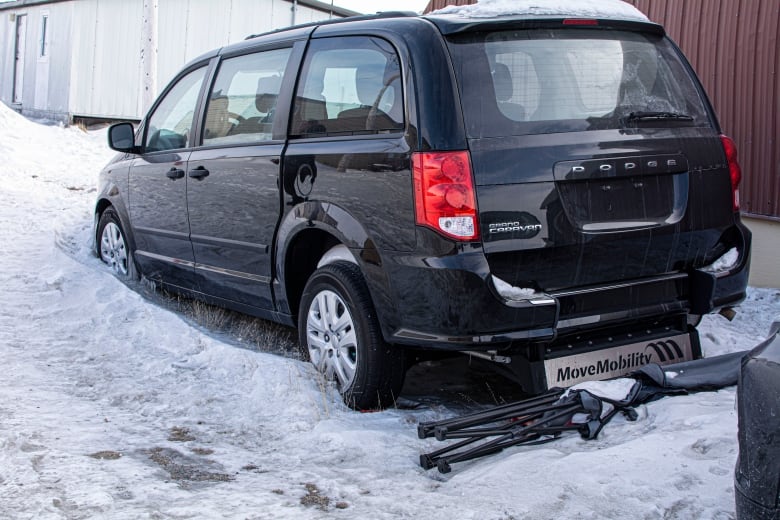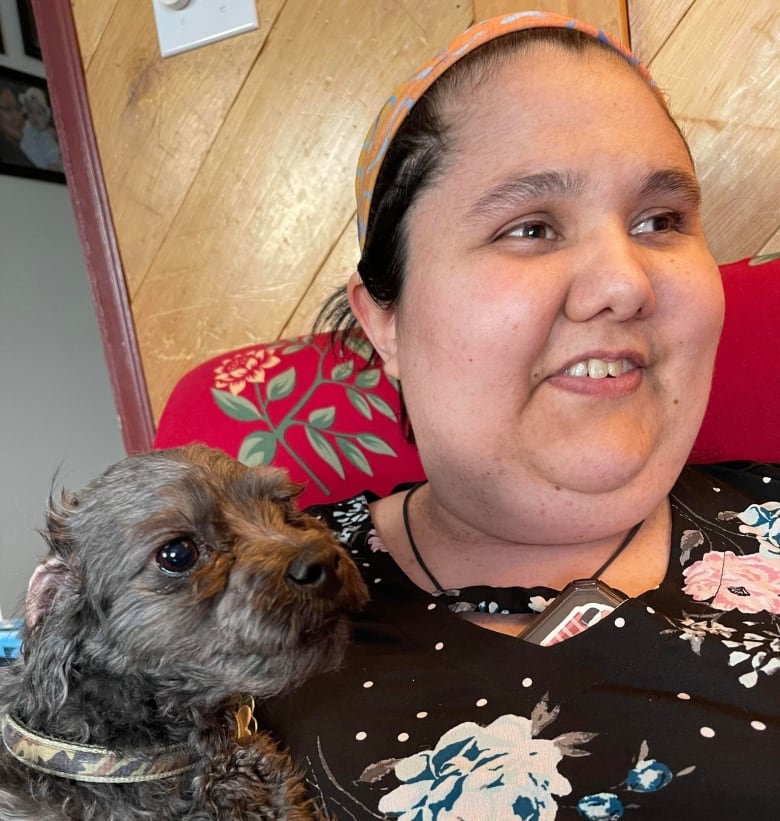In Lynn Rudd’s yard, a black Dodge Grande Caravan sits waiting for repairs. It’s the van she wished she had back when her late father struggled in his wheelchair to get around Rankin Inlet, Nunavut — a rare, accessible vehicle in a community that’s difficult to navigate for people with disabilities.
Rudd’s now hoping to get the van on the road this summer, to help others.
“Anyone who’s able to walk takes for granted that it’s so much harder for people who are low-mobility and in wheelchairs here,” Rudd said.
Wintertime is too cold for most to take their wheelchairs outside; when the snow melts, potholes make it hard to navigate Rankin Inlet’s roads. It was hard on Rudd’s father Pierre Karlik, who eventually became reluctant to leave his house altogether because he didn’t want to be a burden.
It was hard on Rudd, too, who struggled to get her father, who died in 2013, safely from his wheelchair into non-accessible vehicles.
“One time, he just about fell … We were coming out of the health centre and I was trying to put him back into my vehicle, and we both lost our bearings somehow,” she recalled.
“He was falling from between the wheelchair and the back seat of my vehicle, and I was trying to hold on for dear life.”
The wheelchair-accessible van she now owns has never been operational. Though it was a proud moment for Rudd and her daughter Alex when it arrived back in 2017 — they’d held penny sales, sold raffle tickets and even held a gala to raise funds for it — life, and illness, got in the way of putting it on the road.

Lynn and Alex had been working to set up a society in 2018 to operate the van, offering Rankinmiut with mobility problems an easier and safer way to get around their community, when Alex was diagnosed with brain cancer.
“That kind of put the brakes on for me to do anything,” Lynn said.
Alex, 28, died in March in Rankin Inlet with her family all around her.
Lynn said she’s taking time now to grieve and rest. Then, she plans to finish the work she and her daughter started — to help other Rankinmiut who struggle to get around.
“Once my energy is back up, I’d like to get started on it again, get people organized again and get it on the road,” Lynn said.
“There’s a huge need for it to be up and going.”

Alex’s wish
While Alex had to use a wheelchair as her illness progressed, she was no stranger to having a disabling condition.
Born with neurofibromatosis, Alex went through chemotherapy for two years when she was a toddler to treat tumours on her optic nerves that left her blind.
Part of her vision returned, but she lived her life as a legally blind person.
That condition didn’t slow her down. She knew Rankin Inlet well enough to get around without her walking cane, and after high school, she moved to Ottawa to attend the Nunavut Sivuniksavut post-secondary program.
“She did that all on her own … she learned the bus system, so she got on and off buses. She let them know that she was visually impaired,” Lynn said.
“She was resilient.”

Alex loved coffee, butterflies and cooking. She documented her experiences in TikTok videos that gained a large following — posting regular updates on her illness, but also videos of small, precious moments with her family.
She was open on social media about her struggles as she got sicker and it became more difficult for her to leave the house.
It frustrated her that no one had managed to get that accessible van up and running before she lost her ability to walk, Lynn said.
“She wished it was on the road and that she would be able to go for rides.”

A gap in services
Accessible transportation is part of a gap in services for people with disabilities that exists Nunavut-wide, says Noah Papatsie, who works with the Nunavummi Disabilities Makinnasuaqtiit Society.
Papatsie lives in Iqaluit and has spent years advocating for better funding for services across the territory. Aside from transportation and ramps, that includes language services, support for caregivers and mental health support.
“The disability system has been left behind in a lot of services,” he said.
“There’s not a lot of people with accessible equipment, or [who are] learning things in regard to services such as disability services. Nobody has really pushed forward to that.”

Without those services, he noted, it falls to family members like Lynn to support their loved ones.
Though the Nunavut government has acknowledged the magnitude of the contributions made by family members and loved ones, it doesn’t publicly track it.
Support needed for caregivers
Liv Mendelsohn, the executive director for the Canadian Centre for Caregiving Excellence, says that makes it difficult to identify what specific services need to be improved.
“Very little is known about real basics — how many people are having their needs met, how many people have needs that aren’t being met,” she said. “We can’t make sure that we are addressing needs in a culturally appropriate way or with any regard to equity.”
Mendelsohn’s organization is partnering with the Nunavummi Disabilities Makinnasuaqtiit Society to visit all 25 communities in Nunavut and meet with caregivers and people with disabilities.
The hope is to develop a baseline of information on community needs, which will be provided to all levels of government.

Having an accessible vehicle operating in Rankin Inlet is one step in the right direction, according to Lynn Rudd, and would take a “huge weight” off the shoulders of caregivers.
“It’s hard enough to be there for a person that needs a lot of help, when you feel like you’re the only one doing everything. It’s like never-ending worry, never-ending stress. But if there’s a little bit of that help like that out there, that would be a bit more relaxing.”
Originally published in CBC News. View the original article here.


